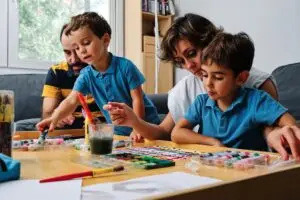Estimated reading time: 8 minutes
Emotional regulation is like a child’s hidden superpower, helping them stay steady even when everything's a mess. When meltdowns happen, I want you to know that it’s not defiance. Rather, it’s often a sign that their brain needs more calm.
Stress, tiredness, or not knowing how to manage emotions can overwhelm kids. Mindfulness and reframing their thoughts can help them feel more in control, confident, and recover quickly.
What is Emotional Regulation?
Emotional regulation means figuring out how feelings work and then learning what to do with them in everyday moments. When they are faced with factors like stress or frustration, they are in need of effective tools to help them deal with their big emotions.
It is understandable that some kids don’t have those skills yet which makes things tough especially when life throws challenges their way. That lack of control can cause kids or teens to go from zero to meltdown in just a matter of seconds.
For younger brains, learning how to respond without flipping out is a game-changer. It’s not about shutting down feelings—it’s about finding better ways to ride the emotional waves without wiping out.
What is the Connection Between Nervous System Dysregulation and Emotion Regulation?
1. The limbic system drives your child's emotions.
It’s your child’s emotional hub, linked to the nervous system and responsible for how they respond to feelings like fear, anger, and joy.
2. The amygdala is an internal alarm.
It spots potential threats and kicks your child's nervous system into fight, flight, or freeze mode.
3. The prefrontal cortex regulates emotions.
It steps in when emotions start spiraling. It regulates emotions by helping your child pause, breathe, and think clearly when everything feels like too much.
4. Dysregulation is present when stress takes over.
Stress overwhelms your child, and their system stays in overdrive, causing dysregulation. This makes it tough for kids to stay calm or even deal with small problems without intense emotional reactions.
5. Emotion regulation skills reset the system.
Imagine your child has a rough day at school because of poor performance. Without emotional regulation skills, their brain goes into overdrive. They help reset both the brain and body, quiet that internal alarm, and build up a child’s capacity for calm, focus, and emotional strength.
Why are Emotional Control Skills Important in Kids?
Emotional control is all about figuring out how to handle your feelings in ways that are both healthy and constructive. Everything starts with noticing. You’ve got to catch those emotions as they bubble up and ask yourself, “Where’s this coming from?” Sometimes it's obvious but other times, it's not.
It all begins with recognizing your own emotions and understanding what triggers them. One of the best tools for achieving this? Mindfulness. By practicing being present and aware of our inner experiences, we create space to respond more thoughtfully.
Learning how to regulate emotions is definitely such a game changer for kids. It helps them face big emotions without getting swept away.
Teaching them to name what they feel is the first building block of emotional intelligence. From there, kids grow the ability to sit with discomfort, tap into positive emotions more easily, and ride out life's ups and downs without falling apart.
10 Emotional Regulation Skills Every Child Should Have
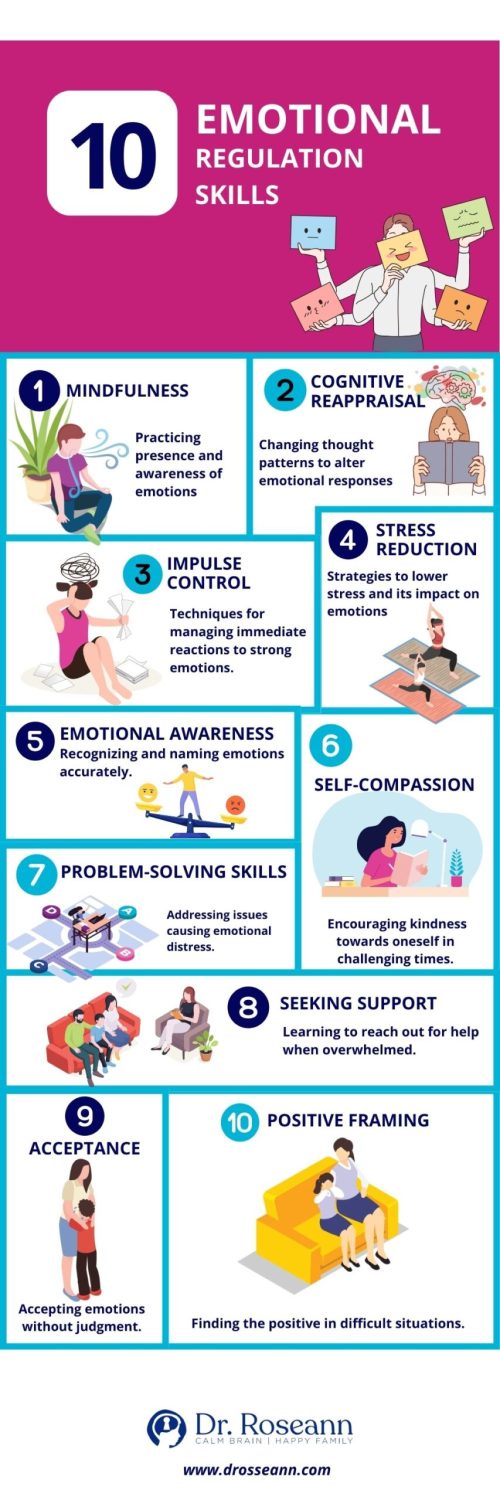
1. Mindfulness Skills for Regulation
Practicing presence and awareness of emotions
Mindfulness is all about being completely present in the here and now, tuning into your thoughts, feelings, and the world around you without any judgment. When you practice mindfulness, you learn to acknowledge your emotions as they come up and observe them without being critical.
Let your kids try deep belly breaths. They can also walk outside and feel their feet hit the ground one step at a time. These practices can build that inner stillness kids crave but don’t know how to find.
2. Cognitive Reappraisal in Daily Situations
Changing thought patterns to alter emotional reactions
Cognitive reappraisal can completely shift how kids handle tough moments. At its core, it means changing how we perceive a situation so we can feel differently about it. It’s about helping a child look at a challenge through a clearer, kinder lens.
When kids learn how to reframe negative thoughts, their whole emotional world starts to soften, helping them maintain a more balanced emotional state. Metacognitive skills are also a big part of this.
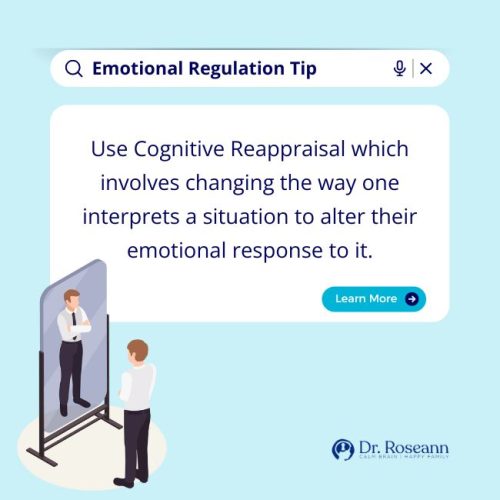
Let’s talk about Ely. He’s 11, mad about soccer, and after a tough loss, he’d usually say something like, “I’m terrible at this. I’ll never win.” Cue the emotional spiral.
Now? He takes a beat and reframes: “Didn’t win today, but I played harder and learned something new.” Simple shift, huge impact. That one change in thinking helps him move forward instead of shutting down. The difference is clear like night and day.
And here's where metacognition kicks in. That’s the skill behind the skill—being aware of your own thinking. When kids learn how they think about what they’re feeling, they start owning their emotional process. They don’t just feel—they understand the feeling.
3. Impulse Control
Techniques for managing immediate reactions to strong emotions.
Impulse control helps kids manage strong emotional responses by pausing before reacting. And when a child learns how to hit pause instead of react on instinct, everything shifts.
Strategies for self-regulation can do real wonders for kids and teens. Sometimes, it’s counting slow and steady up to ten. Other times, it’s squeezing a stress ball until the storm inside settles just enough. Deep breaths, body grounded, mind back online.
4. Stress Reduction
Strategies to lower stress and its impact on emotions
Stress often exacerbates emotional responses. That’s why helping kids lower their stress is such a game changer for emotional regulation.
Children and teens can benefit from activities like exercise, engaging in hobbies, or relaxation exercises that help keep the body open and active by practicing neutral techniques to calm the mind. These aren’t just distractions—they’re reset buttons.
5. Emotional Awareness Skills
Recognizing and naming emotions accurately
Emotional awareness is the ability to recognize and identify one's emotions. The truth is you can’t really manage what you don’t fully understand. If a child doesn’t know what they're truly feeling, how do we expect them to deal with it?
Once they can name the emotion, something just shifts. They start to figure out what they need. They learn how to move through the tough stuff without getting stuck.
When parents make space for open, judgment-free conversations about feelings, children start to see emotions differently. They’re just signals. And once those signals are clear, it gets a whole lot easier to respond with calm, confidence, and control.
6. Self-Compassion
Encouraging kindness towards oneself in challenging times
Self-compassion often gets overlooked but it is one of the most powerful tools kids can carry in their emotional toolkit. When you treat yourself with a more open heart, it becomes easier to grow without feeling like you’re constantly falling short.
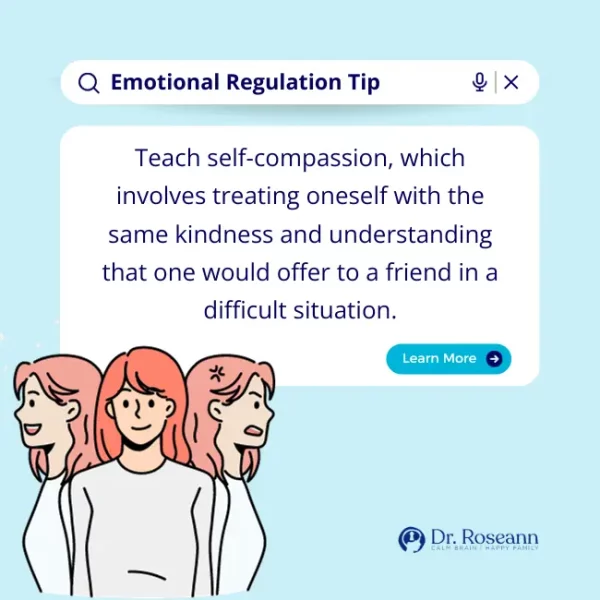
Kids who practice this kind of internal kindness tend to bounce back quicker because they no longer drag emotional upset, guilt and shame behind them like a heavy backpack. This mindset shift helps them embrace mistakes not as shameful moments but as stepping stones to becoming wiser, stronger, and braver.
7. Problem-Solving Skills
Addressing issues causing emotional distress
Problem-solving skills don’t just fix surface-level stuff. They help kids and teens dig down and figure out what’s really setting off those big emotional waves. It starts with spotting what’s actually going on.
The process starts with identifying the problem, then brainstorming, weighing options, and trying out a solution. That shows them they aren’t just stuck waiting for things to get better—they can take action and steer the ship themselves.
8. Seeking Support for Emotion Regulation
Learning to reach out for help when overwhelmed
Knowing when you need help—and being brave enough to ask—isn’t something that comes naturally to every kid. Teaching them how and when to speak up gives them a lifeline when emotions get heavy.
Cuing kids to use a coping strategy or talk things out helps stop those big feelings from spiraling. When children learn that asking for help means strength, not failure, emotional growth really takes root.
Encouraging children to reach out when they are overwhelmed can help prevent negative emotions from escalating and provide them with the tools and resources they need to cope.
9. Acceptance
Accepting emotions without judgment.
Acceptance isn't about ignoring feelings or pretending they're not there. It's about acknowledging them, allowing them space, and then moving forward without getting tangled in the chaos.
Teaching kids to accept their emotions gives them more power over that storm. Once they see emotions as signals instead of threats, they’re on a new path. Calming the brain first unlocks the tools they need to handle whatever comes their way.
10. Positive Reframing
Finding the positive in difficult situations.
Positive reframing turns negatives into growth opportunities. It's like clearing away a foggy window—you start seeing possibilities instead of feeling trapped by frustration.
Imagine a child saying, “I’m terrible at math.” A parent might reply, “Math is tough now, but each practice brings progress—just like with reading!”
This shift in perspective helps kids see obstacles as chances to grow. They’ll feel more confident to keep pushing forward, knowing persistence leads to improvement.
What Does Research Say About Emotional Regulation?
The Link Between Emotional Self Regulation and Mental Health
Emotional regulation plays a vital role in mental health, with research showing that cognitive reappraisal or rethinking situations leads to better outcomes, while expressive suppression or bottling up emotions often worsens them. This highlights the importance of choosing effective strategies (Hu, Zhang, Wang, Mistry, & Ran, 2014).
Early Intervention Matters
Did you know that 8% to 10% of kids under 5 struggle with serious mental health issues? These early problems don’t just go away on their own—they can lead to long-term struggles if left unaddressed.
This is why early intervention is so critical to helping young children build a strong emotional foundation and prevent future challenges (American Academy of Pediatrics, 2021).
Emotion Regulation Is Key for Adolescent Development
Teens who learn to manage their emotions have a leg up in both mental health and social success. A study on young adolescents revealed that emotion regulation strategies like reappraisal and suppression are deeply connected to improved social outcomes, mental health, and overall well-being.
In other words, helping teens build these skills isn’t just nice—it’s essential for their healthy development (Chervonsky & Hunt, 2019).
What Activities and Exercises Build Emotional Regulation?
Helping children to build emotional regulation skills involves strategies like mindfulness, self-soothing, and cognitive reappraisal. Separating emotions from the self can empower them to manage feelings without becoming overwhelmed.
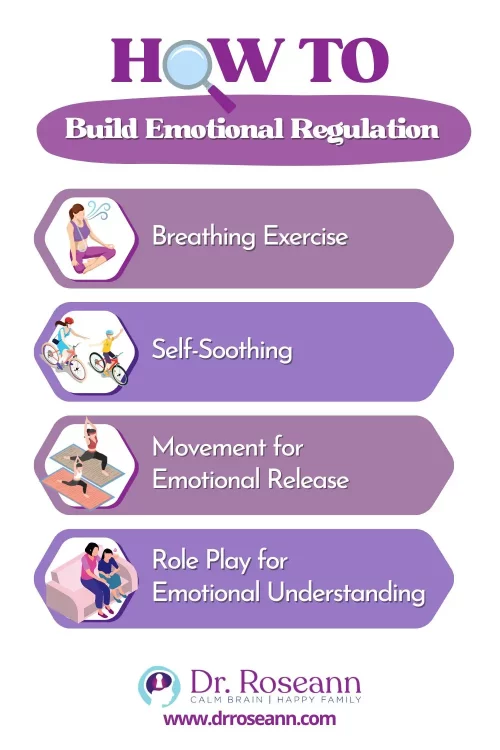
1. Incorporating Breathwork to Calm the Nervous System
Techniques like diaphragmatic breathing, box breathing (4-4-4), and 4-7-8 breathing help calm the nervous system and reduce emotional reactivity. By incorporating mindfulness into these practices, your kids can develop their own style of self-regulation, recognizing that there are differences in how each child may respond to these calming techniques.
2. Self-Soothing Techniques for Self-Regulation
Self-soothing techniques like using sensory items (weighted blankets, fidget toys), engaging in repetitive calming activities, or practicing grounding exercises like the 5-4-3-2-1 method can help reduce stress and promote emotional balance.
3. Movement for Emotional Release
Physical activity, such as walking or stretching, helps release tension and shift stuck emotions. Combining movement with emotional catharsis steps—identify, acknowledge, accept, express, and release—can provide relief and balance.
4. Role Play for Emotional Understanding
Role play is a powerful tool that helps children explore emotions safely in a low-pressure way, while practicing healthy ways to respond. It builds emotional awareness and boosts confidence in handling real-life situations.
Emotional Regulation Skills in Children and Adults
The journey to develop emotional regulation skills in deeply feeling kids is both challenging and rewarding. Parents searching for non-medication alternatives will find that knowing how to manage these behaviors is a great first step in the right direction.
These ten (10) essential self regulation skills serve as effective tools for calming the brain, building resilience, and managing emotional storms. They lay the groundwork for emotional growth and give children the ability to navigate their feelings with more ease and confidence.
When kids learn these skills, they gain the power to understand, process, and grow from their emotional experiences—setting them up for a healthier and more emotionally intelligent future.
Parent Action Steps:
Start practicing these strategies today to empower your child with emotional strength!
Ready to get to the root of your child’s dysregulation? Explore the Dysregulation Solution—a step-by-step program packed with practical tools to help your child calm their brain, strengthen emotional resilience, and thrive through life’s ups and downs. Learn more here.
Explore our BrainBehaviorReset™ Program. Use our solution matcher or tune in to my It’s Gonna Be OK! Podcast for parents to find the right approach.
FAQs
What is Emotional Regulation Disorder?
Emotional Regulation Disorder (ERD) involves difficulty managing emotions, leading to extreme reactions, mood swings, and struggles with returning to emotional balance. It can impact relationships and daily life and is often seen in conditions like ADHD, autism, and mood disorders.
How does developing emotional regulation skills impact child development?
Learning emotional regulation helps children manage stress, solve problems, and develop strong social skills, which are key to emotional and social growth.
Can emotional regulation skills improve mental and physical health?
Yes, emotional regulation enhances both mental and physical health. Techniques like mindfulness, self-compassion, and stress management can reduce tension and fatigue while improving mental well-being.
How do emotional regulation skills promote healthy relationships?
Emotional regulation helps maintain calm, build trust, and foster positive social interactions, which are key to strong, supportive relationships.
Why are emotional regulation skills important for stress management and problem solving?
Emotional regulation supports stress management and problem-solving by helping individuals stay calm, think clearly, and maintain positive emotions when facing challenges.
Citations
American Academy of Pediatrics. (2021). Addressing Early Childhood Emotional and Behavioral Problems. Pediatrics.
Chervonsky, E., & Hunt, C. (2019). Emotion regulation, mental health, and social wellbeing in a young adolescent sample: A concurrent and longitudinal investigation. Emotion, 19(2), 270-282.https://pubmed.ncbi.nlm.nih.gov/29697988/
Dr. Roseann is a mental health expert in Self-Regulation who frequently is in the media:
- Healthline Understanding Self-Regulation Skills
- Scary Mommy What Is Self-Regulation In Children, And How Can You Help Improve It?
- HomeschoolOT Therapy Services Understanding Nervous System Dysregulation in Children: A Guide for Homeschool Parents
Always remember… “Calm Brain, Happy Family™”
Disclaimer: This article is not intended to give health advice and it is recommended to consult with a physician before beginning any new wellness regime. *The effectiveness of diagnosis and treatment vary by patient and condition. Dr. Roseann Capanna-Hodge, LLC does not guarantee certain results.
Are you looking for SOLUTIONS for your struggling child or teen?
Dr. Roseann and her team are all about science-backed solutions, so you are in the right place!
Grab your complimentary copy of
©Roseann Capanna-Hodge








